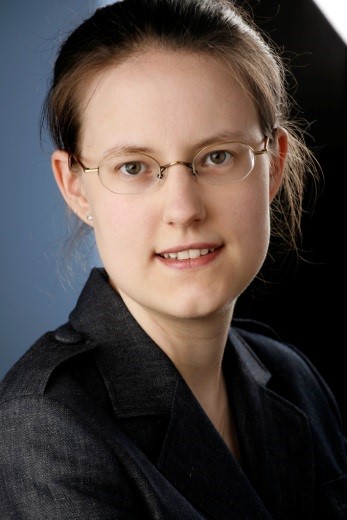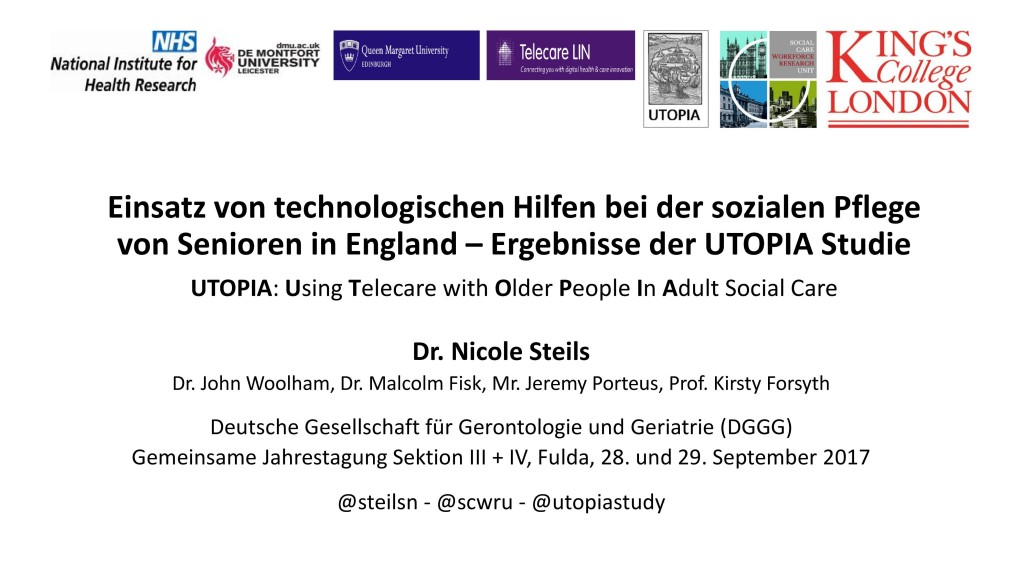 Nicole Steils is a Research Associate at the Social Care Workforce Research Unit in the Policy Institute at King’s College London. In September she presented findings of the UTOPIA (Using Telecare with Older People In Adult Social Care) study to colleagues at the German Society of Gerontology and Geriatrics, sections III and IV, conference in Fulda, Germany. (854 words)
Nicole Steils is a Research Associate at the Social Care Workforce Research Unit in the Policy Institute at King’s College London. In September she presented findings of the UTOPIA (Using Telecare with Older People In Adult Social Care) study to colleagues at the German Society of Gerontology and Geriatrics, sections III and IV, conference in Fulda, Germany. (854 words)
This conference was held at Fulda University of Applied Sciences in Germany. The theme of the two-day conference was ‘Heterogeneity of Age(ing)’. Around 150 delegates attended.
Two keynote presentations started the academic content of the conference. Martina Brandt reported findings on intergenerational care and social policy in the European context based on data from the Survey of Health, Ageing & Retirement in Europe (SHARE) and how various care systems inform the growing social inequalities in giving and receiving care. As the UK was not part of the SHARE project, I was not able to directly learn about similarities and differences between the UK and other European countries. The second keynote was by Hürrem Tezcan-Güntekin who discussed research methods and findings from the German Age Survey, arguing that research in gerontology needs more ‘diversity sensitive’ approaches.
The conference then broke into parallel sessions. On the first day I joined a workshop on ‘Age and technology: potential or future risk?’ Three perspectives on development and use of technology in social care were described: IT, socio-economic, and scientific care perspectives. These were followed by a more general discussion about how different specialisms needed to exchange knowledge with other fields to support the successful use of technology in (social) care. I reflected on the different perspectives and wondered which might have the greatest impact at the present time, as it seemed that especially economic considerations have dominated discussions recently when it came to using technology in care settings, and apparently not only in the UK.
In the evening I was able to join the social evening and dinner and was sitting with, among other participants and completely by coincidence, the presenter of the socio-economic perspective from the earlier workshop. We discussed various aspects of social and health care policies in Germany and the UK, for example the advantages and disadvantages of a more integrated system and the impact of financing health and social care through an insurance scheme in Germany, compared to the separated systems in the UK.
On the second day of the conference I gave my own presentation. About 30 people joined the session termed ‘Technik’. In the first presentation, colleagues from Cologne and Zurich presented findings from a study on the use of physical activity trackers by older people. The second presentation introduced a study on trust in assistive technology (AT) and telecare use among older Germans. The fourth presentation focused on methods of engaging and involving users and/or carers in research and development.
As the session’s third presenter, I had the opportunity to introduce the UTOPIA study to delegates. I started by pointing out the differences of the English care system to the German system and gave a very short introduction to the use of AT and telecare over the last two decades and how social policy and funding had informed its use by local authorities. I followed by exploring the aims and reasons for AT and telecare use, how local authorities assess for AT and telecare, what products and services are provided, how the response to telecare generated alarms is organised and what use of generated data is made by local authorities. I ended with conclusions from the findings.
The presentation seemed to generate considerable interest and many participants asked questions after the presentation, the session and even on the bus to the train after the conference. It became apparent that in Germany AT and telecare, with the exception of personal alarms, is less widespread than in the UK. Commentators were surprised that all English local authorities provide monitoring centres reacting to telecare generated alarms, and that 27% of local authorities are organising response teams instead of sending emergency services when appropriate. Others asked about the impact on family carers and foregrounded the importance of family carers as responders to alarms in Germany and the UK. We also discussed the importance of being able to obtain impartial information and advice. In Germany, after a care assessment, the care insurance will pay for the use of telecare, but users need to find an appropriate provider via the open market.
In the final session presenters and delegates resumed discussions on the impact of technologies on care practice as well as on theories of care and age. One presentation discussed the use of personal alarms and monitored movement sensors in the home and discussed how they were impacting on people’s lives and what this meant for care practice; for example, the need to find a balance between managing risk and undermining privacy.
It was a real privilege to attend the conference and a great opportunity to meet academics and practitioners from other countries and to exchange and discuss different approaches and experiences in social gerontology and especially the use of technology in care. One important message from the whole conference was that there seems to be too much research trying to re-invent the wheel rather than building on previous work, at least in German-speaking countries. Still, I was not so sure if this was only a ‘German’ problem since learning from previous research, best practice and/or mistakes as well as better networking could improve research and development everywhere.
Nicole Steils is a Research Associate at the Social Care Workforce Research Unit in the Policy Institute at King’s College London. See the slides for her presentation (in German) | The UTOPIA project.
